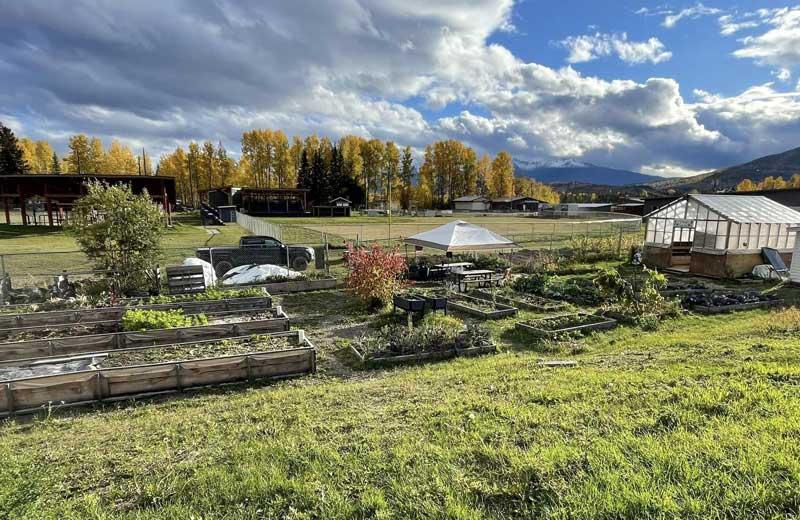Earth Day 2025 calls on us to recognize Our Power, Our Planet — not just in terms of renewable energy, but also the power of communities to lead climate action. As a white, settler dietitian and uninvited guest on Dane-zaa territory, I continue to learn and unlearn what it means to support sustainable food systems. From my perspective, prioritizing First Nations, Métis, and Inuit (hereafter referred to as Indigenous) knowledge and Indigenous food sovereignty* is about more than just food security — it’s about respecting long-standing relationships with the land and waters as essential to our sustainability.
Connecting Indigenous food sovereignty to climate action
Indigenous communities have nourished people and our planet for thousands of years. However, colonial harms including forced resettlement, barriers to economic and agricultural development, and the legacy of residential schools have disrupted traditional foodways. Now, climate change, resource extraction, and environmental degradation further threaten these systems.
“The world cannot feed itself sustainably without listening to Indigenous Peoples.” - FAO
For many people, food is only something to eat, and our relationship with the land is focused on what we can take from it. Indigenous knowledge and practices remind us that food is culture, medicine, and connection, and our relationship with the land can be respectful, where we give back more than we take.
Indigenous food systems:
Reduce environmental harm,
Build resilience and community connection,
Enhance biodiversity, by supporting variety in plants and animals,
Mitigate climate change, and
Align with national and global climate goals, including the UN Sustainable Development Goals.
Indigenous-led projects lead climate resilient food action

In 2021, Northern Health and First Nations Health Authority (Northern Region) worked together to create a grant that specifically supports Indigenous-led food action. The Rural, Remote, and Indigenous Food Action grants (RRI Food Action grants) came together as part of a larger provincial effort to strengthen food security in BC. Since then, 30 projects have received up to $50,000 each to support local food systems. Many of the projects we hear about include multiple strategies that take a holistic approach to food sovereignty and climate resilience, including:
Revitalizing traditional foodways – supporting the legacy of fishing, hunting, agriculture, and gathering food and medicines in ways that sustain the land.
Strengthening local food systems – expanding access to fresh produce and animal proteins while reducing reliance on supply chains.
Reducing waste and practicing regenerative agriculture – composting, soil restoration, and low-waste food systems that nourish the land through skillful cultivation.
Engaging youth – connecting Elders, Indigenous Knowledge Keepers and Holders, and youth to share knowledge about land-based food systems and environmental stewardship
Reflections on the RRI food action grants
Through my work, I recognize the RRI food action grant is only a small part of something much larger. Indigenous foodways hold the power to grow, harvest, and share food in ways that honor traditional knowledge, strengthen communities, and nourish both people and the land. The overall impact of Indigenous community-led action far exceeds what any single program can achieve.
In my short three years working in food security at NH, I’ve learned that truly sustainable local food strengthens local food access, supports fair practices for producers, and makes communities more resistant to supply-chain disturbances. Programs such as the RRI food action grant offer support, but true change only comes from ongoing investment in Indigenous food sovereignty.
Thriving Indigenous food systems benefit all people, and our planet!

By actively supporting Indigenous food systems and Indigenous food sovereignty, we are fighting agricultural decline, promoting sustainability, and taking action on our collective commitments to Truth and Reconciliation. Non-Indigenous people and colonial systems can support Indigenous food sovereignty through listening, unlearning, and meaningful systems change.
On a personal level and outside of my work, part of my learning has been connecting with the territory where I reside and learning about some of the many traditional foods and medicines that grow naturally in my area. I also aim to amplify my learnings, for example, by sharing Indigenous-led initiatives, such as the Tea Creek documentary (available on CBC Gem).
I often think about how Western food systems prioritize efficiency and profit over sustainability, and disrupt ecosystems and local food access in the process. What would a better food system, one that cares for our planet, look like? To answer this question, and to guide our approach to climate action, Indigenous world views encourage us all to work in relationship with the land rather than only taking from it.
*Indigenous Food Sovereignty is essential to addressing food security and has no definition. When invited, NH strives to follow the lead of Indigenous leaders and organizations in food security and food sovereignty work. The Working Group on Indigenous Food Sovereignty has outlined the four key principles that guide Indigenous food sovereignty.














Comments
Anonymous says
Anonymous says